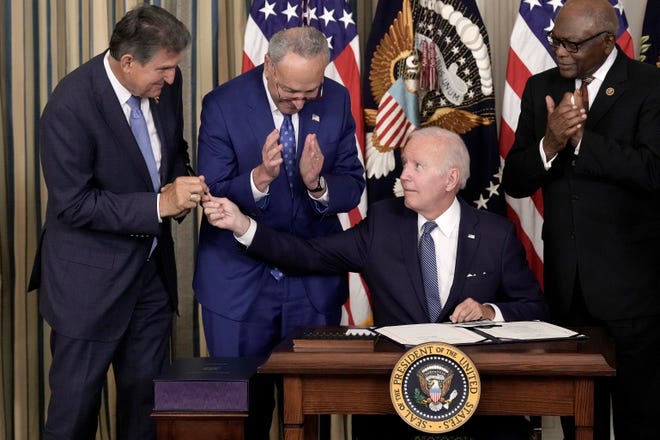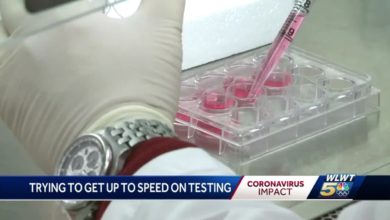
WASHINGTON – With a few strokes of a pen on Tuesday, President Joe Biden turned Democrats' hard-fought climate and health care spending legislation from a bill into a law.
“It’s about showing the American people that democracy still works, notwithstanding all the talk of its demise,” Biden said. "This is a godsend."
He called the package "one of the most significant laws in our history," stressing more than once that every Republican in Congress opposed the bill.
Democrats now face the difficult task of explaining to Americans how they will benefit from the legislation – and when – before this fall's midterm elections, with voting beginning as early as next month in some states.
Biden initially sought a broader bill that included money for child care, preschool and paid family leave, but Democrats could not muster enough support from within their party for the expansive bill he first proposed.
After more than a year of negotiations, Democrats used their bare majority to pass a law that incentivizes clean energy investments, lowers prescription drug costs for seniors and extends health insurance subsidies for millions of others. The package that raises a projected $739 billion in revenue will also reduce the deficit, increase IRS enforcement and set a minimum tax rate for large corporations.
Sen. Joe Manchin, the West Virginia Democrat who blocked the larger package and then negotiated the final version with Senate Majority Leader Chuck Schumer, D-N.Y,, received a round of applause when he entered the State Dining Room for Tuesday's bill signing.
“Joe, I never had a doubt,” Biden said before signing the bill and handing Manchin the pen.
Schumer said the bill "will endure as one of the greatest legislative feats in decades.”
“We persisted and persisted and persisted and never gave up," he said of its tortuous path.
Health care, taxes, climate change:What the Inflation Reduction Act will mean for you
The White House says it will launch a series of videos breaking down the legislation's benefits to average Americans and encourage internet influencers to share content about the law on their social media channels.
Members of Biden's Cabinet will visit nearly two dozen states in August to sell the plan to the public, the White House said in a Monday memo outlining its strategy.

Impact on Small Businesses:What will the Inflation Reduction Act mean for small businesses?
Race to the midterms
The White House is arguing the president and congressional Democrats "beat special interests" while Republicans pushed "an extreme MAGA agenda" to the detriment of American families. It's a message the president, vice president and Cabinet will be driving home in various settings this fall, Biden aides said in a memo that also highlighted bipartisan infrastructure and computer chips manufacturing laws that some Republicans supported.
"I think the politics of these bills are what have we done for the people. And the politics of opposition, I think it's going to be rejected by the American people, who are going to see a party that really does say to them, 'You're on your own,'" House Majority Leader Steny Hoyer, D-Md., told reporters on Friday.
Democrats are hopeful the legislation's promised benefits will help them avoid midterm losses and potentially expand their majority in both chambers of Congress.
"I think it's a big, big win for Democrats in the midterms," Rep. Annie Kuster, D-N.H., told USA TODAY.
Consumer Savings:Here's how the Inflation Reduction Act could save consumers money and protect the planet
Rental Costs Rising:Rent's the new gas: Surging rental prices become a top inflation worry. Who's hit hardest?

Democrats are calling the law the Inflation Reduction Act, in an effort to show voters their governing majority has a plan to improve economic conditions. Gas prices are now below $4 a gallon on average, but the latest Consumer Price Index showed food and housing costs climbing in July.
The Penn Wharton Budget Model, a nonpartisan research initiative, projected the law would reduce the deficit by $264 billion over 10 years but have no measurable impact on inflation. Moody's Analytics assessed the legislation will modestly reduce inflation over the next decade, with the impacts building as reforms to Medicare drug pricing and energy provisions go into effect.
Dark Brandon vs. The Pronoun Patrol:The Illustrated Origin Story of a Biden Meme
Manchin, who claimed credit for the bill's name, said the bill's deficit reduction will "put confidence in the market" and will increase energy production.
"You've got to produce yourself out of this," he said. "If you think that you're going to wait on the Federal Reserve to raise the rates to discourage you from buying anything, that's going to take care of our inflation, that's not how it will take care of inflation."
Some of the bill's biggest provisions won't kick in until 2023 or later.
"Some of it's now and the rules are being written on stuff that's a little bit later," Energy Secretary Jennifer Granholm said about the tax credits for solar panels and rebates for electric cars and for making homes more energy efficient.
Republicans have made the case the law will not have a meaningful impact on inflation.
"This is nothing more than more of the same failed policies with a couple of nice talking points thrown in," said Rep. Tom Emmer, a Minnesota lawmaker who chairs the National Republican Congressional Committee, in an interview.
Emmer said Republicans will also be campaigning against the nearly $80 billion included in the bill for IRS enforcement.
Joel Payne, a Democratic strategist who worked for former Senate Majority Leader Harry Reid, said the White House should present the bill as one part of a broader legislative package that includes the infrastructure and COVID relief bills that passed last year.
"Because I think if you just narrowly focus on this piece of legislation, I think it can kind of feel overly underwhelming. I think if you combine it was like all of the good works, and all of the good policy, I think it could actually be something that's pretty grand, and it's also a bigger tent that a lot of Democrats can run under, " he said.
Final passage: House passes Inflation Reduction Act, sends it to Biden
Still Struggling:July inflation fell to 8.5%, CPI report shows, but small businesses continue to struggle
How frequently Biden will personally be out on the campaign trail delivering that message is unclear. His approval rating has been under 50% for the last year and has not seen a significant uptick after other recent legislative achievements.
The White House said he'll travel to Ohio and Pennsylvania in the coming weeks and host a White House event celebrating the bill's passage on Sept. 6.
Hoyer said he expects the president will be out telling the American people what he has achieved with only a slight Democratic majority in Congress.
"So I think the president's going to be out there campaigning very, very hard," Hoyer said.
Contributing: Kenneth Tran
Source link









